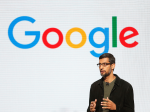Beck Diefenbach/Reuters
- Google is facing backlash following a report that it plans to provide a censored search engine for China.
- Sen. Marco Rubio and even some Google employees are among those criticizing the company.
The big news on Wednesday has been that Google plans to build a censored search engine for China, and condemnation is coming swift and hard from politicians, Google users, and even some Google employees.
The news emerged in a piece from The Intercept, which obtained documents about an internal Google project to relaunch a search service in mainland China, complete with government censorship. The project is codenamed "Dragonfly" and the new service may take the form of an Android app, according to the report.
Other publications followed The Intercept and confirmed the report. Google hasn't issued a statement denying the report. A Google representative told Business Insider the company doesn't "comment on speculation about future plans."
Google employees are already discussing the report, and some comments viewed by Business Insider show many are confused or angry.
Back in 2010, Google pulled its search service out of China because it didn't want to censor the search results.
"Giving benefit of the doubt until we learn more," Sen. Marco Rubio said in a tweet on Wednesday. "But reading how Google has plans to help China set up a censored search engine is very disturbing. They won't help Department of Defense keep us safe but they will help China suppress the truth?"
Tweet Embed://twitter.com/mims/statuses/1024668085654118402?ref_src=twsrc%5Etfw
Giving benefit of the doubt until we learn more. But reading how @Google has plans to help #China set up a censored search engine is very disturbing. They won’t help @DeptofDefense keep us safe but they will help China suppress the truth? https://t.co/S0X3VemOIT
Rubio is referring to Google's recent declaration that it would never build artificial-intelligence tools for weapons or those who could cause harm. Earlier this year, someone inside Google leaked documents that showed Google was providing AI technology to help the Pentagon analyze video footage from drones. Thousands of the company's employees objected and signed a petition demanding that Google end the relationship with the Pentagon and pledge never to use AI for weapons.
Sundar Pichai, Google's CEO, appeared to yield on most of their demands when he issued a set of AI principles.
But Meredith Whittaker, a New York University research scientist and recognized ethicist in artificial intelligence who also happens to be a Google employee, raised questions publicly about whether Google's plan to provide a censored search service in China violated the company's new AI principles.
"WTF!" Whittaker wrote in a Twitter post. "How enabling mass politically-directed censorship of (AI-enabled) search isn't a violation of Article 19 & in turn a violation of Google's pledge not to build tech that 'contravenes widely accepted principles of...human rights' is a mystery indeed."
Tweet Embed://twitter.com/mims/statuses/1024677028660953088?ref_src=twsrc%5Etfw
😡WTF! How enabling mass politically-directed censorship of (AI-enabled) search isn't a violation of Article 19 & in turn a violation of Google's pledge not to build tech that "contravenes widely accepted principles of...human rights" is a mystery indeed...https://t.co/iFWL1GM1ix
Work at Google? You can contact the reporter of this story, Greg Sandoval, at gsandoval@businessinsider.com
NOW WATCH: NYU professor says Facebook should pay taxes for making us less productive
See Also:
